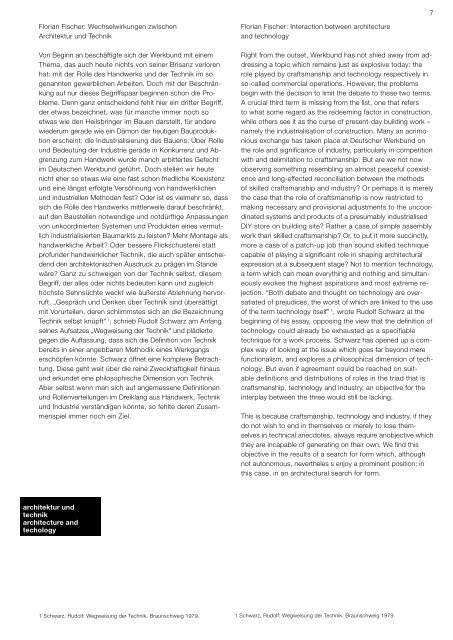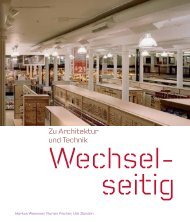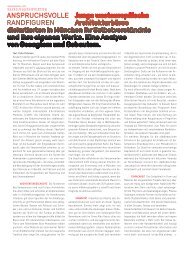werkbundsiedlung wiesenfeld 5 werkbundtage 2: material und technik
werkbundsiedlung wiesenfeld 5 werkbundtage 2: material und technik
werkbundsiedlung wiesenfeld 5 werkbundtage 2: material und technik
Erfolgreiche ePaper selbst erstellen
Machen Sie aus Ihren PDF Publikationen ein blätterbares Flipbook mit unserer einzigartigen Google optimierten e-Paper Software.
Florian Fischer: Wechselwirkungen zwischen<br />
Architektur <strong>und</strong> Technik<br />
Von Beginn an beschäftigte sich der Werkb<strong>und</strong> mit einem<br />
Thema, das auch heute nichts von seiner Brisanz verloren<br />
hat: mit der Rolle des Handwerks <strong>und</strong> der Technik im so<br />
genannten gewerblichen Arbeiten. Doch mit der Beschränkung<br />
auf nur dieses Begriffspaar beginnen schon die Probleme.<br />
Denn ganz entscheidend fehlt hier ein dritter Begriff,<br />
der etwas bezeichnet, was für manche immer noch so<br />
etwas wie den Heilsbringer im Bauen darstellt, für andere<br />
wiederum gerade wie ein Dämon der heutigen Bauproduk-<br />
tion erscheint: die Industrialisierung des Bauens. Über Rolle<br />
<strong>und</strong> Bedeutung der Industrie gerade in Konkurrenz <strong>und</strong> Ab-<br />
grenzung zum Handwerk wurde manch erbittertes Gefecht<br />
im Deutschen Werkb<strong>und</strong> geführt. Doch stellen wir heute<br />
nicht eher so etwas wie eine fast schon friedliche Koexistenz<br />
<strong>und</strong> eine längst erfolgte Versöhnung von handwerklichen<br />
<strong>und</strong> industriellen Methoden fest? Oder ist es vielmehr so, dass<br />
sich die Rolle des Handwerks mittlerweile darauf beschränkt,<br />
auf den Baustellen notwendige <strong>und</strong> notdürftige Anpassungen<br />
von unkoordinierten Systemen <strong>und</strong> Produkten eines vermut-<br />
lich industrialisierten Baumarkts zu leisten? Mehr Montage als<br />
handwerkliche Arbeit? Oder bessere Flickschusterei statt<br />
prof<strong>und</strong>er handwerklicher Technik, die auch später entschei-<br />
dend den architektonischen Ausdruck zu prägen im Stande<br />
wäre? Ganz zu schweigen von der Technik selbst, diesem<br />
Begriff, der alles oder nichts bedeuten kann <strong>und</strong> zugleich<br />
höchste Sehnsüchte weckt wie äußerste Ablehnung hervorruft.<br />
„Gespräch <strong>und</strong> Denken über Technik sind übersättigt<br />
mit Vorurteilen, deren schlimmstes sich an die Bezeichnung<br />
Technik selbst knüpft“ 1 , schrieb Rudolf Schwarz am Anfang<br />
seines Aufsatzes „Wegweisung der Technik“ <strong>und</strong> plädierte<br />
gegen die Auffassung, dass sich die Definition von Technik<br />
bereits in einer angebbaren Methodik eines Werkgangs<br />
erschöpfen könnte. Schwarz öffnet eine komplexe Betrachtung.<br />
Diese geht weit über die reine Zweckhaftigkeit hinaus<br />
<strong>und</strong> erk<strong>und</strong>et eine philosophische Dimension von Technik.<br />
Aber selbst wenn man sich auf angemessene Definitionen<br />
<strong>und</strong> Rollenverteilungen im Dreiklang aus Handwerk, Technik<br />
<strong>und</strong> Industrie verständigen könnte, so fehlte deren Zusammenspiel<br />
immer noch ein Ziel.<br />
architektur <strong>und</strong><br />
<strong>technik</strong><br />
architecture and<br />
techology<br />
Florian Fischer: Interaction between architecture<br />
and technology<br />
Right from the outset, Werkb<strong>und</strong> has not shied away from ad-<br />
dressing a topic which remains just as explosive today: the<br />
role played by craftsmanship and technology respectively in<br />
so-called commercial operations. However, the problems<br />
begin with the decision to limit the debate to these two terms.<br />
A crucial third term is missing from the list, one that refers<br />
to what some regard as the redeeming factor in construction,<br />
while others see it as the curse of present-day building work –<br />
namely the industrialisation of construction. Many an acrimo-<br />
nious exchange has taken place at Deutscher Werkb<strong>und</strong> on<br />
the role and significance of industry, particularly in competition<br />
with and delimitation to craftsmanship. But are we not now<br />
observing something resembling an almost peaceful coexistence<br />
and long-effected reconciliation between the methods<br />
of skilled craftsmanship and industry? Or perhaps it is merely<br />
the case that the role of craftsmanship is now restricted to<br />
making necessary and provisional adjustments to the uncoordinated<br />
systems and products of a presumably industrialised<br />
DIY store on building site? Rather a case of simple assembly<br />
work than skilled craftsmanship? Or, to put it more succinctly,<br />
more a case of a patch-up job than so<strong>und</strong> skilled technique<br />
capable of playing a significant role in shaping architectural<br />
expression at a subsequent stage? Not to mention technology,<br />
a term which can mean everything and nothing and simultan-<br />
eously evokes the highest aspirations and most extreme re-<br />
jection. “Both debate and thought on technology are oversatiated<br />
of prejudices, the worst of which are linked to the use<br />
of the term technology itself” 1 , wrote Rudolf Schwarz at the<br />
beginning of his essay, opposing the view that the definition of<br />
technology could already be exhausted as a specifiable<br />
technique for a work process. Schwarz has opened up a com-<br />
plex way of looking at the issue which goes far beyond mere<br />
functionalism, and explores a philosophical dimension of tech-<br />
nology. But even if agreement could be reached on suitable<br />
definitions and distributions of roles in the triad that is<br />
craftsmanship, technology and industry, an objective for the<br />
interplay between the three would still be lacking.<br />
This is because craftsmanship, technology and industry, if they<br />
do not wish to end in themselves or merely to lose them-<br />
selves in technical anecdotes, always require anobjective which<br />
they are incapable of generating on their own. We find this<br />
objective in the results of a search for form which, although<br />
not autonomous, nevertheles s enjoy a prominent position: in<br />
this case, in an architectural search for form.<br />
1 Schwarz, Rudolf: Wegweisung der Technik. Braunschweig 1979. 1 Schwarz, Rudolf: Wegweisung der Technik. Braunschweig 1979.<br />
7








